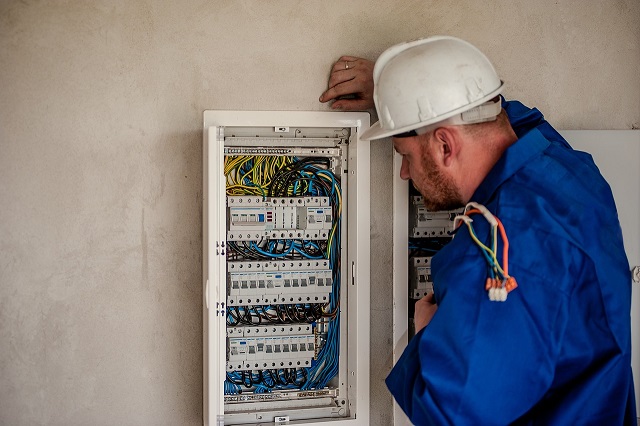Updated December 2024
If you're the type of person who likes solving problems and is curious about how mechanical things work, you should consider pursuing a career as an electrician.
These skilled technicians are responsible for creating the wiring that powers our society, from our homes and workplaces to the lights on our streets.
Not only is it an important occupation for keeping our modern lives running smoothly and safely, but an electrician career also offers excellent job security and employment prospects.
While the construction industry is the largest employer of electricians, there remains high demand for electricians even during times of slower growth in the overall industry.
This is partly because of the increasing amount of electrical technology in our homes and businesses, which requires trained professionals to install, repair, and maintain.
Interested in becoming a construction electrician?
Explore the typical duties you'll perform at work, key skills you'll need to succeed, and career opportunities available once you finish your pre-apprenticeship training.
Understanding your Role as a Construction Electrician
Construction electricians generally focus on larger projects, such as upgrading an entire floor of an office tower or installing an electrical system for a new building. They're responsible for ensuring the wiring and electrical components are up to code and work efficiently and safely.
As with all careers in construction, safety is always a top priority, and training in this area should be a key part of your construction and maintenance electrician program. You can expect your coursework to include hazard awareness and protection training for:
- Working at heights
- Working in confined spaces
- Using scaffolding
- Controlling traffic
- Lock out and tag safety (proper procedures for controlling and shutting off specialized equipment to avoid injury and electric shock)
With projects in a wide variety of environments and day-to-day duties that vary according to the stage of production, electrician work is always challenging and interesting.
Depending on the situation, electricians may work with higher voltage systems, oversized appliances, and varying load demands, materials, and energy needs.
What you Need to Become a Good Construction Electrician
Electricians are problem solvers who need both physical capabilities and strong communication skills.
Although you don't need to be a superhuman athlete, the job does require the strength and mobility to lift and carry heavy equipment, climb ladders, and move through small spaces.
Are you in good shape and good with your hands?
Working with hand and power tools, an electrician's duties often include:
- Installing and repairing fixtures, switches, circuit breakers, and other equipment
- Splicing, joining, and connecting wires to form circuits
- Troubleshooting electrical and electronic systems, isolating problems, and replacing broken parts
At the construction site, you'll be interpreting architectural drawings and electrical code specifications.
It's essential that construction electricians are detail-oriented and can accurately follow oral and written instructions, take precise measurements, and make basic calculations to ensure installations meet code requirements.
Using Construction Electrician Skills on the Job
A typical day at work for an electrician might involve installing cable trays, which support the electrical cables that get distributed through a building.
Here's how your day might go:
- Your day would begin by receiving instructions from your supervisor, who would let you know what stage the installation is at right now, and important details to be aware of.
- You'll fill out a "start card" at the work area, determining what exactly needs to be done, the tools you'll need, and any potential hazards involved in the job.
- When installing the cable trays, you need to figure out the necessary lengths by first measuring the sizes on the blueprint. Then you calculate the actual length you'll need using the blueprint's scale ratio.
- You'll probably have to cut the required length by measuring a standard tray with a tape measure and cutting with a hacksaw.
- Trays connect to each other using splice plates. You'll need to drill holes to attach these plates to the cable trays and bolt the trays to the building's supports.
Career Outlook for Construction Electricians
As with other trades, construction electricians must complete an apprenticeship involving both classroom studies and on-the-job training before they can get certified. It's a wise investment because there is a very positive employment outlook for electricians, good job security, and plenty of room for promotions and personal growth.
Students taking electrician courses in Ontario will be happy to hear that the Government of Canada Job Bank awarded this region three out of five stars for overall employment outlook for electricians through 2026. Demand is even stronger in the Toronto region, which received a four-star rating.
A good electrician can always find work. Common employers include electrical contractors, manufacturers, wholesalers, and maintenance departments of buildings.
Self-employment is also possible. Some construction electricians work in heavy industry with massive power supplies, while others specialize in restorative or retrofit work.
Since the electrician's work is always highly individualized to each specific situation, there's no danger of losing jobs to automation.
On the contrary, the increasing adoption of solar, wind, and other clean energies will require talented construction electricians to ensure safe and efficient wiring for eco-friendly installations.
Interested in becoming a construction electrician?
Explore the construction and maintenance electrician pre-apprenticeship training at Herzing College, delivered at the Ottawa, Toronto, and Cambridge campuses. Chat live with an admissions advisor to get your questions answered now, or click below to browse the program in more detail. We're here to help!






